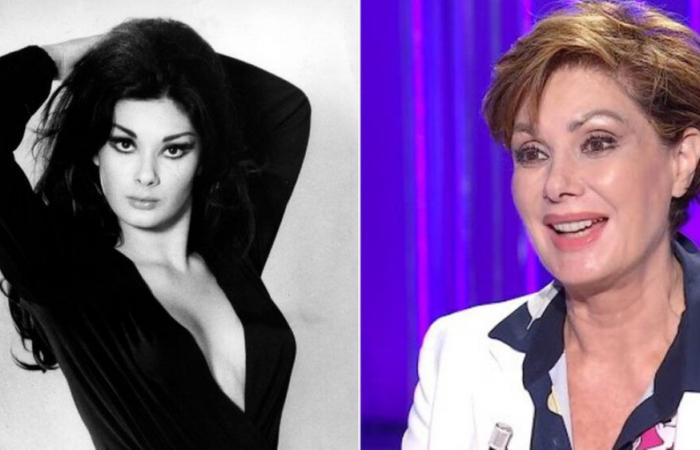Edwige Fenech is the guest of the Saturday November 2 episode of 'Ballando con le stelle'. After the couple formed by Fabio Caressa and Benedetta Parodi, it is the turn of the actress and film producer to put herself to the test with dance. What is the woman who was one of the sexy icons of Italian b-movies doing today?
Edwige Fenech, who is she
Edwige Fenech was born in Annaba (at the time Bône), then in French Algeria, on December 24, 1948 (she was 76 years old). She is the daughter of Felix, of Maltese origin, and Yvonne, an Italian from Acate in the province of Ragusa, of which she became an honorary citizen. After her parents divorced, she moved with her mother to Nice, France, where she attended high school and studied dance and medicine. She was noticed while walking in the street and hired for a small role in the film 'All crazy about him' by Norbert Carbonnaux. She was linked for 11 years to the director and producer Luciano Martino, then for 18 years to Luca Cordero di Montezemolo. She has a son named Edwin Fenech, born in 1971, whose paternity has been the subject of scandalous gossip. Initially, Fenech attributed the paternity of the child to the actor Fabio Testi, with whom she had a romantic relationship for three years, saying that the child was the fruit of her precise desire and that he was born when the relationship with Testi was already worn out. She later denied this paternity, without however wanting to reveal the identity of the father. Since 2015, she has decided to live stably in Lisbon, Portugal. She declares herself Catholic.
The beginnings of his career
In 1967, she won the Lady France beauty contest, which took place in May during the Cannes Film Festival, and won the right to represent France at Lady Europe, where she placed third. She was noticed by a talent scout who asked her to shoot in Italy, as the protagonist, the film 'Samoa, regina della giungla', directed by Guido Malatesta. For the same director, she played in 'Aquila Nera', before transferring to Germany. She returned to Italy for two films with Franco and Ciccio: 'Don Franco e don Ciccio nell'anno della contestazione' and 'Satiricosissimo' (where she played the Empress Poppea). Between the end of the sixties and the beginning of the seventies, she played in films of the giallo genre popular at that time. She began a lasting collaboration especially with the director Sergio Martino, with titles like 'Lo strano vizio della signora Wardh', which made her become an icon of erotic giallo.
Success
In 1972, she was the protagonist of 'Quel gran pezzo dell'Ubalda tutta nuda e tutta calda' by Mariano Laurenti, a film that became a cult of trash cinema, like the following 'Giovannona Coscialunga disonorata con onore'. She obtains the role of protagonist in the sexy Italian comedy which she will keep for a decade. The first films of the latter genre performed by Edwige Fenech are '40 gradi all'ombra del lenzuolo' by Sergio Martino, with Tomas Milian, and 'La poliziotta fa carriera', with Mario Carotenuto and Alvaro Vitali from 1976, until the last film from the series which is from 1981. In 1976, she appeared in the film 'La pretora', directed by Lucio Fulci. She also starred in numerous thriller and horror films: in 1972 she starred in 'Tutti i colori del buio', with George Hilton and Ivan Rassimov, while in 1975 she starred in 'Nude per l' assassino'. Among the other films, we remember the war film 'Il grande attacco' by Umberto Lenzi and the fantasy film, with Paolo Villaggio, directed by Steno, 'Dottor Jekyll e gentile signora'.
sexy icon
She is considered by the male audience as a true sexy icon. The directors are aware of her voluptuous body and a strong provocative seductive charge. Directors do not hesitate to show it in each film. She poses nude several times for the Italian edition of the magazine Playboy.
On television and in the theater
After the film season passed, in the eighties, with the birth of the first private channels, she participated in the editions of the programs 'Ric e Gian folies', broadcast in 1983 on Italia 1, 'Bene, bravi, bis' (1984, with Franco Franchi and Ciccio Ingrassia), still broadcast on Italia 1 and winner of the Telegatto, and in the 1985 edition of 'Risatissima', a Saturday night show broadcast on Canale 5 and also winner of the Telegatto, with Lino Banfi and Paolo Villaggio . She made her theater debut in 1985 with the drama 'D'amore si muore' by Giuseppe Patroni Griffi, with Massimo Wertmüller, Fabrizio Bentivoglio, Monica Scattini. Then, she moved on to the presentation on Rai 1 of 'Sotto le stelle' (1986), 'Immagina' (1987-88), 'Carnevale' (1988), 'Palcoscenico Italia' (1988), 'Sulla cresta dell'onda ' (1989), 'Un tesoro di capodanno' (December 31, 1990 on Rai unified networks), but the affirmation on television comes with the 1989-90 edition of 'Domenica in', under the direction of Gianni Boncompagni. She presented the Sanremo Festival 1991, with Andrea Occhipinti, and then presented 'Singoli' (1997), still on Rai 1.
What is she doing today
Since the 1990s, she has been involved in television and film production through her company Immagine e cinema. The first work produced was the television miniseries 'Il coraggio di Anna', in 1992. Among the films she produced, 'Il mercante di Venezia' from 2004. In 2007 she returned in front of the camera, contacted by the American director Quentin Tarantino, for a cameo in 'Hostel: Part II', sequel to 'Hostel', still directed by Eli Roth, his fans declared: in his 'Bastardi senza gloria', the character played by Mike Myers is called ' Ed Fenech', in tribute to the actress. In 2012, she played the role of Catherine II of Russia in the television miniseries 'La figlia del capitano', of which she is also a producer. In 2015 she starred in the fiction 'È arrivedata la felicità', broadcast by Rai 1 and performed with Claudio Santamaria and Claudia Pandolfi, of which she was also a producer. In 2023, she returns to cinema, as a protagonist, directed by Pupi Avati in the film 'La quattordicesima domenica del tempo ordinario'.
© ALL RIGHTS RESERVED
This article is automatically translated






